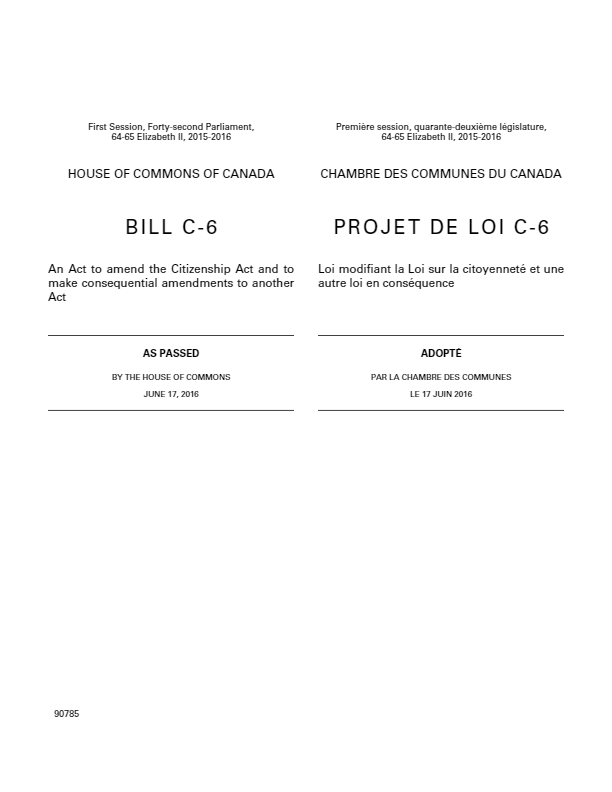
详解:2017加拿大公民法修正方案 Bill C-6
背景
加拿大新《公民法》(简称C6法案)的正式生效,经历了漫长的等待。加拿大保守党于2014年6月对当时的《公民法》做出C-24法案的修订,大幅提高申请成为加拿大公民的难度。于是当联邦自由党上任之后,承诺对此进行修改并提出C-6法案。在经历国会参众两院反复的修订辩论之后,终于将分成三个阶段实施,部分从6月19日开始,部分从2017年秋季正式实施,最后一部分将在2018年初正式实施。
Bill C-6 是现行加拿大公民法的修改法案,于2017年6月19日经国会三读批准通过,正式实施。下列表格通过比较新旧法案,说明分期实施的变动细节。
- 2017年6月19日立即生效的部分法条
- 2017年秋季实施的部分法条
- 2018年春季实施的部分法条
Bill C-6, an Act to amend the Citizenship Act and make consequential amendments to another Act, received Royal Assent on June 19, 2017. This chart explains the changes that have been made to the Citizenship Act and indicates when these changes are expect
| 旧法
Previous Citizenship Act |
新法
Citizenship Act with Bill C-6 Amendments |
|---|---|
| 根据罪行判罚刑责,或参与他国与加拿大作战的武装部队,或组织,如果被判定叛国,间谍,和恐怖攻击,拥有双重国籍的人士将被褫夺加拿大公民身份。
Citizenship could be revoked from dual citizens convicted of treason, spying and terrorism offences, depending on the sentence received, or who were a part of an armed force of a country or organized group engaged in conflict with Canada. |
此条例被废止。 加拿大居住的双重国籍的人士被判罚此类罪行,将与其他加拿大公民一视同仁,只需面对加拿大的司法系统处罚。 This provision is repealed. Dual citizens living in Canada who are convicted of these crimes will face the Canadian justice system, like other Canadian citizens who break the law. |
| 申请人如果获得加拿大公民身份,需要有长期在加拿大居住的意愿。
Applicants were required to intend to continue to live in Canada if granted citizenship. |
此条例被废止。
申请人一旦获得加拿大公民身份,不需有长期在加拿大居住,以便加拿大公民根据个人原因或事业考量自由选择。 This provision is repealed. Applicants are no longer required to intend to continue to live in Canada once granted citizenship. This provides more flexibility to Canadians who may need to live outside of Canada for work or personal reasons. |
| 加拿大移民部长可根据自由心证简化加拿大公民法5(1)条例的要求,以便未成年人士可以获得加拿大公民身份,即使其父母不是加拿大公民。
The Minister had the discretion to waive certain requirements under subsection 5(1) of the Citizenship Act so a minor could obtain citizenship without a Canadian parent. |
加拿大公民法5(1)条例中的年龄要求被取消,未成年人士现在可以申请加拿大公民身份,即使其父母非加拿大公民。
未成年人士的监护人或经法庭判决,书面协议或司法认定的监护人,可以代理申请该未成年人士的加拿大公民身份。 Minors can now apply for citizenship without a Canadian parent, as the age requirement for citizenship has been removed under subsection 5(1). A person having custody of the minor or empowered to act on their behalf by court order, written agreement or operation of law, can now apply for citizenship on behalf of the minor, unless that requirement is waived by the Minister. |
| 以前无服刑人员的条例
No provision existed to prevent individuals serving a sentence in the community (a conditional sentence order) from being granted citizenship, taking the Oath of Citizenship or counting this time towards meeting the physical presence requirements for citizenship. |
正在服刑的人士不能获得加拿大公民身份,或进行公民宣誓,或将服刑期计入在加拿大的居住时间。
Individuals serving a conditional sentence will not be granted citizenship, take the Oath of Citizenship, or be able to count this time towards meeting the physical presence requirements for citizenship. |
| 部长可以酌情审批加拿大公民身份,以便减缓异常艰困的案情或嘉奖对加拿大有特殊意义的人士。
The Minister has the discretion to grant citizenship to a person to alleviate cases of special and unusual hardship, or to reward services of an exceptional value to Canada. |
追加无国籍作为独立条款,酌情审批加拿大公民身份
Statelessness has been added as a stand-alone ground that can be considered for a discretionary grant of citizenship. |
| 移民部安排有适当措施,以满足加拿大公民申请人的需求。然而,未特别提及残疾人的需求。
The Department has reasonable measures to accommodate the needs of citizenship applicants. However, there was no explicit reference to accommodate persons with disabilities in the Citizenship Act. |
要求安排措施,以满足身体残疾的加拿大公民申请人的需求。
The requirement to take into consideration reasonable measures to accommodate the needs of a citizenship applicant who is a disabled person is now included in the Citizenship Act. |
| 申请时间在2015年6月11日之后的申请人保持加拿大公民身份申请时的要求,直到公民宣誓仪式结束。
The requirement for applicants to maintain the requirements for citizenship from the time they apply for citizenship until taking the Oath of Citizenship only applied to applications received on or after June 11, 2015. |
这一要求改为也适用于2015年6月11日之前的申请案例。
This requirement now also applies to all applications, including those received before June 11, 2015. |
| 旧法
Previous Citizenship Act |
新法
Citizenship Act with Bill C-6 Amendments |
|---|---|
| 申请人必须在6年内在加拿大居住满4年。
Applicants had to be physically present in Canada for four out of six years before applying for citizenship. |
在申请加拿大公民身份之前,申请人必须在5年内在加拿大居住满3年。
Applicants must be physically present in Canada for three out of five years before applying for citizenship. |
| 申请人必须在6年内,根据加拿大税法依法纳税4年,证明在加拿大的居住时间。
Applicants had to file Canadian income taxes, if required to do so under the Income Tax Act, for four out of six years, matching the physical presence requirement. |
申请人必须在5年内,根据加拿大税法依法纳税3年,证明在加拿大的居住时间。
Applicants must file Canadian income taxes, if required to do so under the Income Tax Act, for three out of five years, matching the new physical presence requirement. |
| 申请人至少在6年内,在加拿大居住4年,每年不少于183天。
Applicants had to be physically present in Canada for 183 days in four out of the six years preceding their application. |
此条例被废止。
This provision is repealed. Applicants no longer have to meet this requirement. |
| 在成为加拿大永久居民前的加拿大居住时间不能计入公民申请的居住时间。
Time spent in Canada prior to becoming a permanent resident did not count towards the physical presence requirement for citizenship. |
申请人可将成为加拿大永久居民前在加拿大居住的每一天折半计入加拿大公民申请的居住时间,最长不超过1年。
Applicants may count each day they were physically present in Canada as a temporary resident or protected person before becoming a permanent resident as a half-day toward meeting the physical presence requirement for citizenship, up to a maximum credit of 365 days. |
| 14-64周岁的加拿大公民申请人必须完成入籍语言测试和加拿大入籍常识测试。
Applicants between 14 and 64 years had to meet the language and knowledge requirements for citizenship. |
18-54周岁的加拿大公民申请人必须完成入籍语言测试和加拿大入籍常识测试。
Applicants between 18 and 54 years must meet the language and knowledge requirements for citizenship. |
| 旧法
Previous Citizenship Act |
新法
Citizenship Act with Bill C-6 Amendments |
|---|---|
| 加拿大移民部长负责裁定是否褫夺加拿大公民身份,依据虚假信息,蓄意伪证,和隐瞒事实。
加拿大联邦法庭负责裁定与国家安全,人道,人权,和组织犯罪类的虚假信息,蓄意伪证,和隐瞒事实的褫夺加拿大公民身份案例。 The Minister was the decision-maker for most cases of citizenship revocation on the grounds of false representation, fraud, or knowingly concealing material circumstances. The Federal Court was the decision-maker for citizenship revocation cases involving false representation, fraud, or knowingly concealing material circumstances related to security, human or international right violations, and organized criminality. |
加拿大联邦法庭全权负责裁定是否褫夺加拿大公民身份,除非有要求部长特许。
The Federal Court is the decision-maker in all revocation cases, unless the individual requests that the Minister make the decision. |
| 无明确规定公民资格审查官有权负责查没申请人的伪造文件或涉嫌伪造的文件。
There was no clear authority for Citizenship Officers to seize fraudulent or suspected fraudulent documents provided under the Citizenship Act. |
明确加拿大公民资格审查官员查没申请人的伪造文件或涉嫌伪造的文件。
Clear authority for Citizenship Officers to seize fraudulent or suspected fraudulent documents is provided under the Citizenship Act. |

